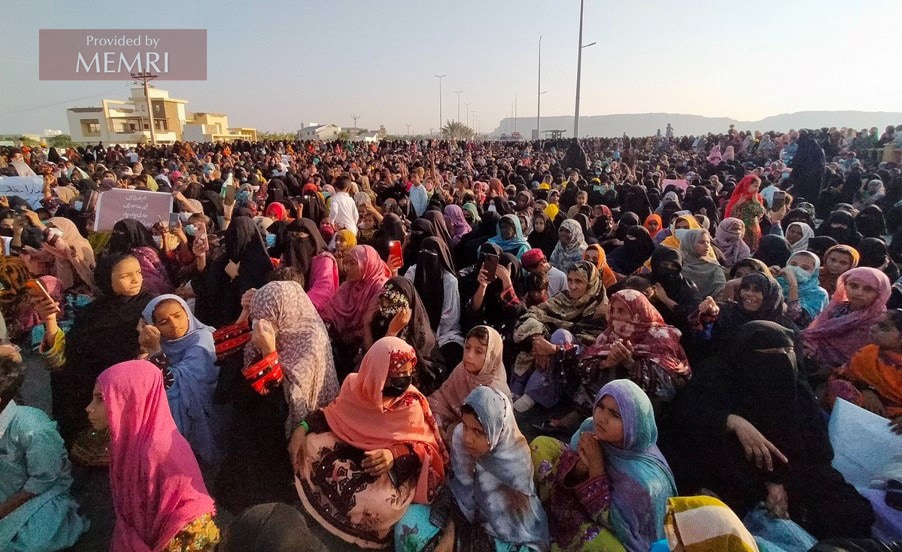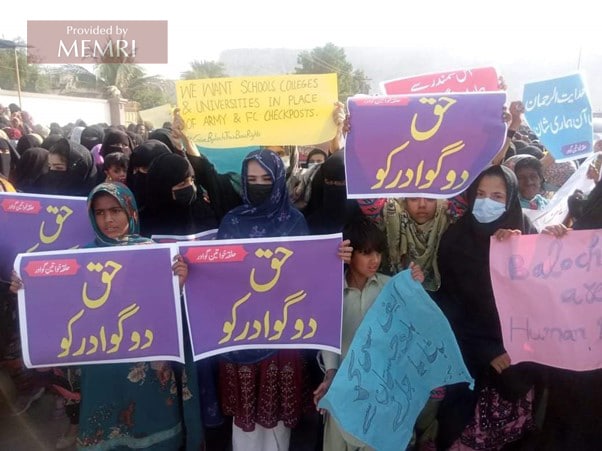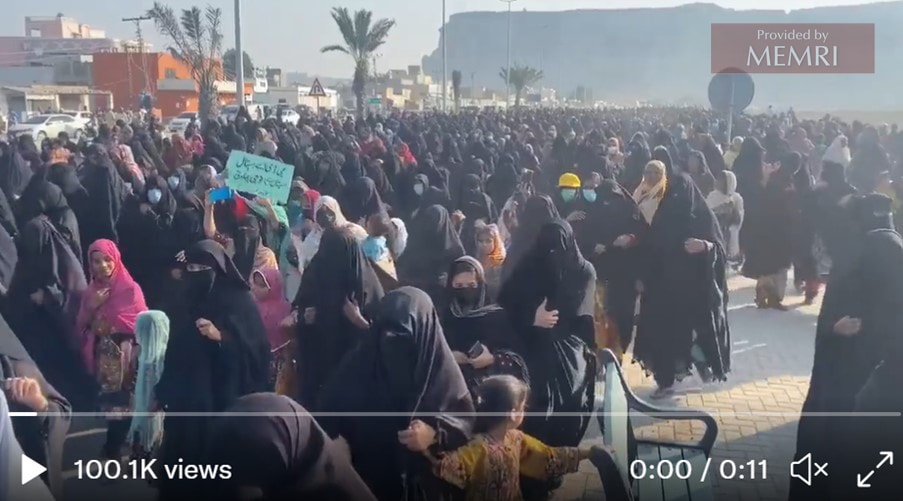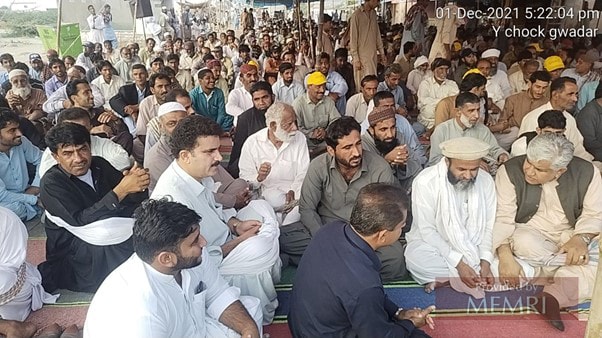A surging wave of protests by ordinary women led by a Jamaat-e-Islami Pakistan leader is increasing in the coastal Pakistani city of Gwadar, where China is building a strategic port, is threatening the future of the China-Pakistan Economic Corridor (CPEC). It has the potential to alter the course of geopolitical relations that Pakistan and China have sought to build in recent years with the goal of undercutting Western influence. If the protests swell and succeed, China's debt-trap diplomacy will lose in a big way right in its own neighborhood.

November 29: Women protesters in Gwadar demand basic rights
On November 29, 2021, thousands of ordinary Baluchi women turned out on Gwadar's coast in an unprecedented demonstration demanding essentially very basic rights. The placards they held in their hands had simple slogans: "Give rights to Gwadar"; "We are Baloch, We have self-respect." Essentially, the protesters are demanding basic rights such as education and jobs. This protest movement has come to be known as Haq Do Gwadar Ko ("Give Rights To Gwadar") or Haq Do Tehreek (the "Give Rights Movement") for short.
Thousands of women from Turbat, Ormara, Jewani, Pasni, and other areas of Gwadar district participated in the rally, setting out from Al-Johar Public School and ending at Marine Drive of Gwadar city.[1] According to a media report, the participants said the breadwinners of their homes were without jobs and called for ending illegal fishing by large trawlers and for easing restrictions on border trade with Iran.[2]
A day later, on November 30, the Chinese Foreign Ministry Spokesperson Zhao Lijian was dismissive of the mass protests: "This is completely fake news. Certain media's hyping up of the protests against China in Gwadar region lacks factual basis."[3] Zhao Lijian added: "China firmly rejects certain media's attempts to smear the CPEC building and China-Pakistan relations."[4] Notwithstanding the contemptuous assertion by the Chinese spokesman, the videos and pictures show a demonstration of political will by women that even the Pakistani military's powerful apparatus will find it difficult to crush.
The November 29 protests were part of a series of continuing protests that entered their 18th day on December 2, 2021. On December 3, the legislative assembly of Punjab, a politically influential province, adopted a resolution expressing concern that the protesters included a large number of women and children who had to take to streets for their fair demands. The resolution demanded that the federal government of Pakistan "listen to the grievances of the people of Gwadar who have been protesting for many days and address their problems on a priority basis."[5]
The protesters are not terrorists or members of jihadi groups that the Pakistani military can crush under its boots. These are ordinary women, mostly covering their faces as is customary for women across South Asia or wearing burqas because they are led by Jamaat-e-Islami Pakistan, a religious-political party with a large support base. Their key leader is Maulana Hidayat-ur-Rehman, the secretary general of Jamaat-e-Islami Pakistan for Baluchistan province. The protesters are mainly women, and the protests are spreading to small towns in Baluchistan, which is territorially the largest province.
Senior journalist Hamid Mir expressed displeasure over the mainstream media's neglect of the recent protests. Tweeting in Urdu, Mir said: "On Gwadar's seacoast, women today held a big rally. A few days ago too, inhabitants of Gwadar held a rally of shrouds [for dressing the dead] but sadly the 'national media' often ignores the protests in Gwadar and other parts of Baluchistan."[6] The Friday Times, a liberal website, headlined its report as: "In a first, women take to the streets in Gwadar against rights violations."[7]
Commenting on the November 29 protests, Maulana Hidayat-ur-Rehman, the local religious leader helming the protests, tweeted in Urdu: "There was no home today in Gwadar from where our respected sisters and daughters and mothers did not come to participate in this rally. The women of Gwadar have today written a history, have expressed their awareness for their rights. Never mind the province; there is no precedent for it in the entire country. The time has come to give them their rights."[8]
On December 1, men and women from Gwadar, Turbat, Pishkan, Zamran, Buleda, Ormara, and Pasni taking part in the protests blocked a major highway. Maulana Hidayat-ur-Rehman told Dawn.com, a liberal daily, that the protesters not only blocked the Makran Coastal Highway from four different locations on Thursday (December 2), but a "shutter-down strike" was also observed in Gwadar, with shops and markets closed across the coastal city and fishermen across the district also not turning to the sea.[9]
Leading these protests over the previous few weeks, the Jamaat-e-Islami Pakistan leader has emerged as the voice of Gwadar's people and his demands resonate among Baluchi people across Baluchistan, a province highly militarized due to the Chinese interests in the region, especially the CPEC, and also due to the recurring secessionist movements led by Baluchi rebels and threats posed by jihadi groups like the Tehreek-e-Taliban Pakistan (the Movement of the Pakistani Taliban, TTP) and the Islamic State (ISIS). Baloch Freedom Front, which advocates secession of Baluchistan from Pakistan, tweeted on the success of protests: "Seems like our #Balochistan is a step closer to freedom. Once in a while such moments come, rarely in history of which time stands testimony and which creates a niche in history..."[10] It is unlikely that the secessionist groups will be able to take advantage of these protests.
"There is no need for the military; teachers and doctors are needed. Not security checkpoints, [but] schools and hospitals are needed," Maulana Hidayat-ur-Rehman declared at another protest on December 2 at Pasni, about 110 kilometers from Gwadar. In Baluchistan, a province that is both impoverished and territorially the largest, the Pakistani military lacks legitimacy in the eyes of the people and is accused of picking up youths and political activists, detaining them for months at unknown places, and often killing them. Several students and teachers have disappeared from Balochistan University in recent weeks, believed to have been picked up by Pakistani intelligence agencies, leading to continuing student protests against what has come to be known as "enforced disappearances."[11]

Maulana Hidayat-ur-Rehman, the local leader leading the protests
Journalist Muhammad Akbar Notezai noted: "Maulana... continues to rise as a leader in Gwadar. Local Baloch [Baluchi people] follow him, not because of his religious or party affiliation, but they believe he discusses their issues in a way no one else does."[12] Notezai quoted a local man as saying: "[Maulana Hidayat-ur-Rehman] says vociferously and collectively what one thinks he himself needs to have dared to say, but through him, we have a voice: Gwadar belongs to us first, and we no longer want to be ignored."[13]
Earlier on November 18, a shroud-wearing protest in Gwadar was organized by Maulana Hidayat-ur-Rehman. Thousands of shroud-wearing demonstrators marched through different streets of Gwadar chanting slogans against local officials and the government, and raising "various issues ranging from the presence of large fishing trawlers to lack of health facilities and drinking water."[14]
At the time, the protesters raised three key demands: removal of security checkposts in several areas of Pushkan, Sarbandan, and Gwadar city which affect the local people; complete removal of commercial fishing trawlers affecting the local fishermen's livelihood; and easing of the curbs at the border with Iran for easier trade. "The presence of fishing trawlers has caused quite a stir among people living across Baluchistan’s coastal areas, as their livelihood mostly depends on fishing. The protesters say this kind of fishing is destroying the marine life and depriving the local fishermen of their livelihood," a report noted.[15] It took weeks for Prime Minister Imran Khan to intervene in the matter. Amid the continuing protests in Gwadar, Khan tweeted on December 2: "I have taken notice of the very legitimate demands of the hardworking fishermen of Gwadar. Will be taking strong action against illegal fishing by trawlers..."[16]
Maulana Hidayat-ur-Rehman has grown in stature like any local politician emerges – by raising local issues. Professor Mumtaz Baloch of the Balochistan University's political science department commented on the rise of the Islamic leader: "Among other things, in politics, one has to address the current question, no matter what background credentials one has. That is what Maulana Hidayat-ur-Rehman is doing. At the same time, he is filling the vacuum that political forces have left vacant for quite some time."[17]
By every account Maulana Hidayat-ur-Rehman is a local political leader, but by his location in Gwadar is also sitting at the hub of the China-Pakistan Economic Corridor (CPEC). The projects under CPEC are valued in 2020 at $62 billion, from the original $47 billion.[18] The U.S. rose to a superpower status, inevitably as a consequence of Great Britain's decline after the end of the World War II. China hopes to succeed as the superpower, inevitably as a result of the American decline and retreat from the global arena, especially from Afghanistan.
Some points that can be said about these protests are as follows. One, the Chinese Foreign Ministry Spokesperson Zhao Lijian, who rejected the protests, may be right in a limited sense that the protesters are not directly raising anti-China demands. But the protests are taking place at the hub of the CPEC protests with the potential to destroy Chinese ambitions in the region to launch a trade route by road right across Pakistan to the Gwadar port and from there by sea to the Middle East and beyond.
Second, as Baluchistan province is territorially large and sparesely populated in parts, it will not be easy to steer the protests to a level where they can threaten the stability of the government. This is one of the reasons secessionist Baluchi movements have not succeeded in the past. Third, the leader of the protests, Maulana Hidayat-ur-Rehman, belongs to Jamaat-e-Islami Pakistan, a religious-political party that supports the idea of Pakistan as an Islamic state, and will not push the protests beyond a point where the Pakistani state could be destabilized.
Following are images of the protests:

November 29: Ordinary women and children joined the protests in Gwadar

November 29: Placards held by women read "Give rights to Gwadar"

November 29: A large number of burqa-clad women joined the protests

November 29: A view of the women's protests on Gwadar's Marine Drive

November 29: Women marched on foot from across the district to join protests in Gwadar

December 1: Maulana Hidayat-ur-Rehman and other protester

December 2: A protest meeting at Pasni, 110 kilometers from Gwadar

December 2: Protesters block a highway, expanding the protests to other towns

December 1: Men protesters in Gwadar, two days after the women's protests
* Tufail Ahmad is a Senior Fellow at MEMRI
[1] Daily Balochistan Express (Pakistan), November 30, 2021.
[2] Dawn.com (Pakistan), November 29, 2021.
[3] Tribune.com.pk (Pakistan), December 1, 2021.
[4] Tribune.com.pk (Pakistan), December 1, 2021.
[5] Dawn.com (Pakistan), December 3, 2021.
[6] Twitter.com/HamidMirPAK, November 29, 2021.
[7] TheFridayTimes.com (Pakistan), November 30, 2021.
[8] Twitter.com/MHidayatRehman, November 29, 2021.
[9] Dawn.com (Pakistan), December 2, 2021.
[10] Twitter.com/BalochFreedomF, December 1, 2021.
[11] DailyExcelsior.com (India), November 20, 2021; TheBalochistanPost.net (Pakistan), November 12, 2021.
[12] Dawn.com (Pakistan), December 1, 2021.
[13] Dawn.com (Pakistan), December 1, 2021.
[14] Dawn (Pakistan), November 19, 2021.
[15] Dawn (Pakistan), November 19, 2021.
[16] Twitter.com/ImranKhanPTI, December 12, 2021.
[17] Dawn.com (Pakistan), December 1, 2021.
[18] Cpicglobal.com, accessed December 2, 2021.




